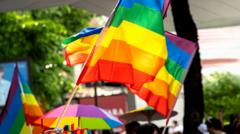Ghanaian lawmakers have reintroduced a contentious bill threatening severe jail sentences for LGBT individuals and their advocates, now scrutinized by human rights organizations. The bill's reintroduction threatens economic stability and reflects a growing divide between progressive and conservative values within the nation.
Ghana's MPs Push for Controversial Anti-LGBT Bill Amid International Outcry

Ghana's MPs Push for Controversial Anti-LGBT Bill Amid International Outcry
A newly resubmitted anti-LGBT bill in Ghana proposes harsh penalties for homosexuality, reigniting debates over human rights and cultural values.
A group of ten Members of Parliament in Ghana have revived a highly controversial anti-LGBT bill, potentially imposing some of the strictest regulations on LGBT rights in Africa. The proposed legislation includes penalties such as three years in prison for individuals identifying as gay, and five to ten years for supporters or advocates of LGBT rights. Initially passed by parliament last year, the bill was left unsigned by former President Akufo Addo, who cited municipal legal concerns before his departure from office in January.
Human rights organizations, both national and international, have unequivocally condemned the bill, labelling it draconian. The previous bill lapsed when parliament closed, leaving uncertainty about whether the new parliamentary speaker will permit it for consideration. In the conservative West African nation, homosexual acts are already subject to a three-year prison sentence.
Former President John Dramani Mahama expressed a desire for state sponsorship of the bill to foster wider discourse and support. He believes that any progression on the issue should come from consensus building among stakeholders. Proponents of the bill view it as a means of safeguarding Ghanaian cultural and familial integrity.
Conversely, advocates for human rights assert that the bill contradicts Ghana’s history of tolerance and hospitality, with Human Rights Watch’s Larissa Kojoué warning of potential increases in violence against LGBT people and their supporters. Ghanaian trans activist Va-Bene Elikem Fiatsi highlighted the emotional toll of the bill's reintroduction, emphasizing the resilience of the LGBT movement in the face of adversity.
Economically, the implications of the bill are concerning; past warnings from former finance ministers indicate it could jeopardize approximately $3.8 billion in World Bank funding and adversely impact a $3 billion IMF support program. Supporters of the bill, such as opposition lawmaker John Ntim Fordjour, dismiss fear of economic backlash, pointing to a global shift towards conservative ideals, as evidenced by statements from former US President Donald Trump.
Originally introduced to parliament in 2021, the bill has encountered numerous delays, but with its reintroduction, the national conversation surrounding LGBT rights and human dignity in Ghana is reigniting. As the world watches, the prospects for Ghana's LGBT community continue to hang in the balance.























